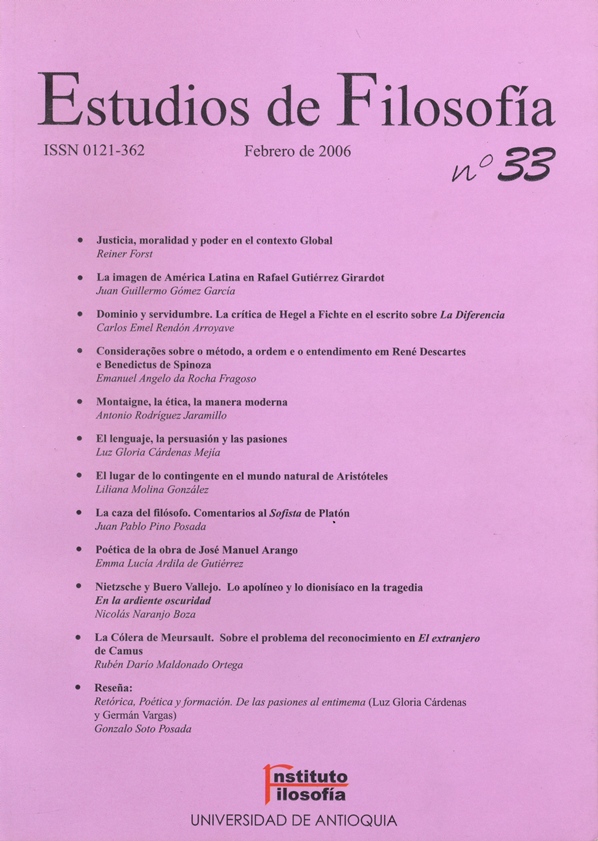Justice, morality and power in the global context
DOI:
https://doi.org/10.17533/udea.ef.12819Keywords:
global justice, human rights, poverty, dominanceAbstract
Throught this reflection on the theories of Global Justice, the author introduces a normative basis for Realist and Critical Theory. He considers that certain moral proposals about the problems of severe poverty and underdevelopment are lacking in normative foundations which they need to focus on. This is so since they consider institutional, economical, and political realities of injustices in a global context The author introduces the rational principle of justification in order to establish the normative basis ofa Realist and Critical Theory.
Downloads
References
Pogge Thomas. World Poverty and Humans Rights. Cambridge, Polity Press, 2002.
Forst Reiner. "Das Grundlege Recht auf Rechtfertigung. Zu einer konstruktivistischen Konzeption von Menschenrechten”, en: Hauke Brunkhorst, Wolfgang R. Köhler und Mathias Lutz-Bachmann. Recht auf Menschenrechte. Menschenrechte, Demokratie und internationale Politik. Frankfurt am Main, Suhrkamp, 1999, pp. 66-105.
____________ . “El derecho básico a la justificación: hacia una concepción constructivista de los derechos humanos”, en: Estudios Politicos, No. 26, 2005, pp. 27-59. DOI: https://doi.org/10.17533/udea.espo.1405
Forst Reiner, "Zu einer kritischen Theorie transnationaler Gerechtigkeit", en: SchmOcker R., Steinvorth U. (eds). Gerechtigkeit und Politik. Philosophische Perspektiven. Akademie Verlag, 2001, pp. 215-232. DOI: https://doi.org/10.1524/9783050047669.215
Downloads
Published
How to Cite
Issue
Section
Categories
License
Copyright (c) 2006 Reiner Forst

This work is licensed under a Creative Commons Attribution-NonCommercial-ShareAlike 4.0 International License.
Authors who publish with this journal agree to the following terms:
1. The Author retains copyright in the Work, where the term "Work" shall include all digital objects that may result in subsequent electronic publication or distribution.
2. Upon acceptance of the Work, the author shall grant to the Publisher the right of first publication of the Work.
3. The Author shall grant to the Publisher a nonexclusive perpetual right and license to publish, archive, and make accessible the Work in whole or in part in all forms of media now or hereafter known under a Creative Commons Attribution-NoCommercia-ShareAlike (CC BY-NC-SA 4.0), or its equivalent, which, for the avoidance of doubt, allows others to copy, distribute, and transmit the Work under the following conditions: (a) Attribution: Other users must attribute the Work in the manner specified by the author as indicated on the journal Web site;(b) Noncommercial: Other users (including Publisher) may not use this Work for commercial purposes;
4. The Author is able to enter into separate, additional contractual arrangements for the nonexclusive distribution of the journal's published version of the Work (e.g., post it to an institutional repository or publish it in a book), as long as there is provided in the document an acknowledgement of its initial publication in this journal;
5. Authors are permitted, and Estudios de Filosofía promotes, to post online the preprint manuscript of the Work in institutional repositories or on their Websites prior to and during the submission process, as it can lead to productive exchanges, as well as earlier and greater citation of published work (see The Effect of Open Access). Any such posting made before acceptance and publication of the Work is expected be updated upon publication to include a reference to the Estudios de Filosofía's assigned URL to the Article and its final published version in Estudios de Filosofía.















